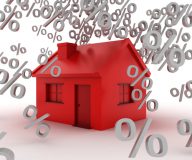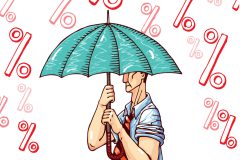By The Spy on
September 18, 2020
—The Mortgage Report: Sept. 18— Variable Discounts Improve Further Bankers are making more dinero on floating-rate loans. That’s motivating them to cough up some profit and sharpen their variable rate pencils. Online brokers are now effectively as low as prime – 0.93% on default-insured variables in some provinces. Uninsured customers (including those refinancing) get milked for more, as usual, but...
read more
By The Spy on
September 11, 2020
—The Mortgage Report: Sept. 10— CIBC has dropped the following special fixed rates: 5yr (high-ratio): 2.07% to 1.97% 5yr (uninsured): 2.24% to 2.14% 7yr: 2.71% to 2.61% It’s the first time ever that a Big 6 Canadian bank has widely and openly advertised a 5-year fixed rate under 2%, albeit it’s only on default-insured mortgages. This development is more symbolic...
read more
By The Spy on
August 31, 2020
Grandfathering Remains in Effect Okay, you really shouldn’t be as happy as these people if you have to do an end-around to pass the stress test, but nonetheless… If you’re switching lenders to get a better deal, the best 5-year mortgage rates are usually available only on insured or insurable mortgages. And that’s a problem if your property value has...
read more
By The Spy on
August 25, 2020
—The Mortgage Report: Aug. 25— Yes. The Question is: When? Most readers know that fixed mortgage rates follow bond yields. But it’s bond yields south of the border that are particularly influential for Canadian mortgage rates — given U.S. influence on our economy. To get to 1.49% on discounted 5-year fixed rates, we need a Canadian 5-year bond yield near...
read more
By The Spy on
August 19, 2020
—The Mortgage Report: Aug. 19— Properly’s “Backup Offer” for Home Sellers Someday, the majority of Canadian home sellers will get a quote from an iBuyer. What’s an iBuyer? It’s a company that offers you roughly 7% less than fair market value to buy your home…fast. Why would someone take 7% less? Because some people place a high value on speed,...
read more
By The Spy on
August 16, 2020
—The Mortgage Report: Aug. 16— HSBC Cuts HSBC slashed a bunch of key rates going into the weekend, setting record lows on a variety of terms. That included reductions to these special fixed rates: 3yr: 2.19% to 1.99% Canada’s lowest-ever 3yr refi rate 5yr: 2.09% to 1.96% Canada’s lowest-ever 5yr refi rate 5yr (high ratio): 1.89% to 1.76% Canada’s lowest-ever...
read more
By The Spy on
August 13, 2020
A Two-Month High for the 5-year Yield Canada’s #1 fixed mortgage rate indicator, the 5-year bond yield, has stubbornly refused to challenge its March record low. And now it has turned upwards, closing Thursday at the highest level in two months: 0.44%. Concerns over inflation and massive government debt issuance are two key reasons. A close above 0.55% could indicate...
read more
By The Spy on
August 8, 2020
Effective this week, it gets a little easier to buy a house or refinance. On Saturday, BMO and CIBC shaved 15 basis points off their posted 5-year fixed rates. That’s enough to drop the benchmark 5-year posted rate to 4.79%. Given regulators use this benchmark rate to calculate Canada’s minimum mortgage stress test, today’s cuts mean you’ll now need less...
read more
By The Spy on
August 4, 2020
—The Mortgage Report: Aug. 4— Historic 5-year Yield: On Tuesday the U.S. 5-year Treasury traded just 19 basis points above zero—where it’s never been before. If it drops a smidgen lower, that could be enough to drag Canada’s 5-year yield (and hence, 5-year fixed mortgage rates) to record lows as well. Stay tuned. Setting the Pace: Tangerine now has the...
read more
By The Spy on
July 28, 2020
—The Mortgage Report: July 28— A Paper-Thin Spread: The gap between fixed and variable rates is as narrow as it’s been in months. The most competitive mortgage providers now sell 5-year fixed rates for less than 7 basis points above the cheapest variable rates. That “fixed-variable spread” could soon become negative, as it was in early March. Fixed rates are...
read more
 log in
log in









